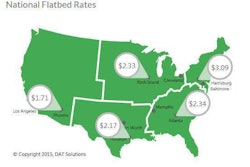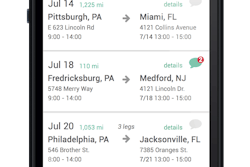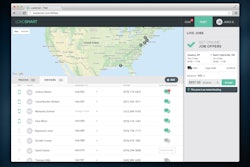 During a Sylectus user conference, business owners build partnerships in the Alliance network.
During a Sylectus user conference, business owners build partnerships in the Alliance network.Online load boards have traditionally not handled functions that come after rates are negotiated such as freight tracking and billing. Some new online services can manage transactions end to end.
Omnitracs Sylectus has a protected load board called the Alliance network that is used primarily by carriers in the expedited industry. The load board is integrated with its transportation management software for carriers called Alliance Pro. Carriers that use Alliance Pro are able to dispatch assets from their peers as if they were their own assets. For carriers, it’s like having a virtual private fleet.
V3 Transportation, a Cleveland-based provider of expedited freight transportation, has seen rapid growth by using the network with Alliance Pro. The company started in 2013 and grew its customer base by 47 percent in 2014 and its revenue by 73 percent year-over-year. It now has 85 trucks.
The fleet is able to operate as a national carrier by tapping its own network of more than 200 partner carriers to fulfill nearly every load request from customers, says John Sliter, chief executive officer.
Another way that online communities are changing is that users are checking in more frequently with mobile apps to do more than just find loads.
After owning a Los Angeles-based freight forwarding company, Ivan Tsybaev moved to Silicon Valley to start a company called Trucker Path. The original plan was to develop a freight transportation marketplace platform for shippers, carriers and brokers to connect electronically and automate time-consuming tasks like freight matching, price negotiations, and load tracking.
“When we started building a marketplace, we realized we had a problem: we didn’t have carriers or shippers. We had no value for anyone,” says Tsybaev, chief executive and founder of Trucker Path.
Trucker Path created an app for the Android platform to give truckers and fleets useful trip planning tools, all for free. About 450,000 drivers use its free mobile app for navigation and other useful tools.
The company is now building a marketplace for shippers, brokers and carriers to automate freight transactions. It is beta testing a web-based load board that interfaces with the smartphone app to automate load searches by location. The load board, called Trucker Path Truckloads, is free to brokers and carriers during the initial testing phase.
The load board will continue to evolve into what Charles Myers, vice president of strategy and a member of Trucker Path’s board of directors, describes as an optimized marketplace.
The marketplace will be a “closed loop” system or private network, he ways, with tools that automate the entire freight transaction between brokers and pre-approved carriers. Carriers can tender pre-priced loads to themselves as well as submit offers. And all of the documentation will be electronic, he says, from the initial load confirmation to tracking, proof of delivery and payment.
In many ways, trucking is becoming more like the travel industry by sharing instant pricing information.
With 90 percent of motor carriers operating less than six trucks, mobile apps give brokers and shippers a way to automate communications with owner operators and small fleets.
A mobile app called Uber gives passengers instant rates between any local origin and destination and connects them to drivers to make a pickup within minutes. How could booking a truckload shipment ever been this easy?
To help attract and retain good carriers, several companies now offer free, online fleet management systems for fleets to dispatch their equipment and drivers.











